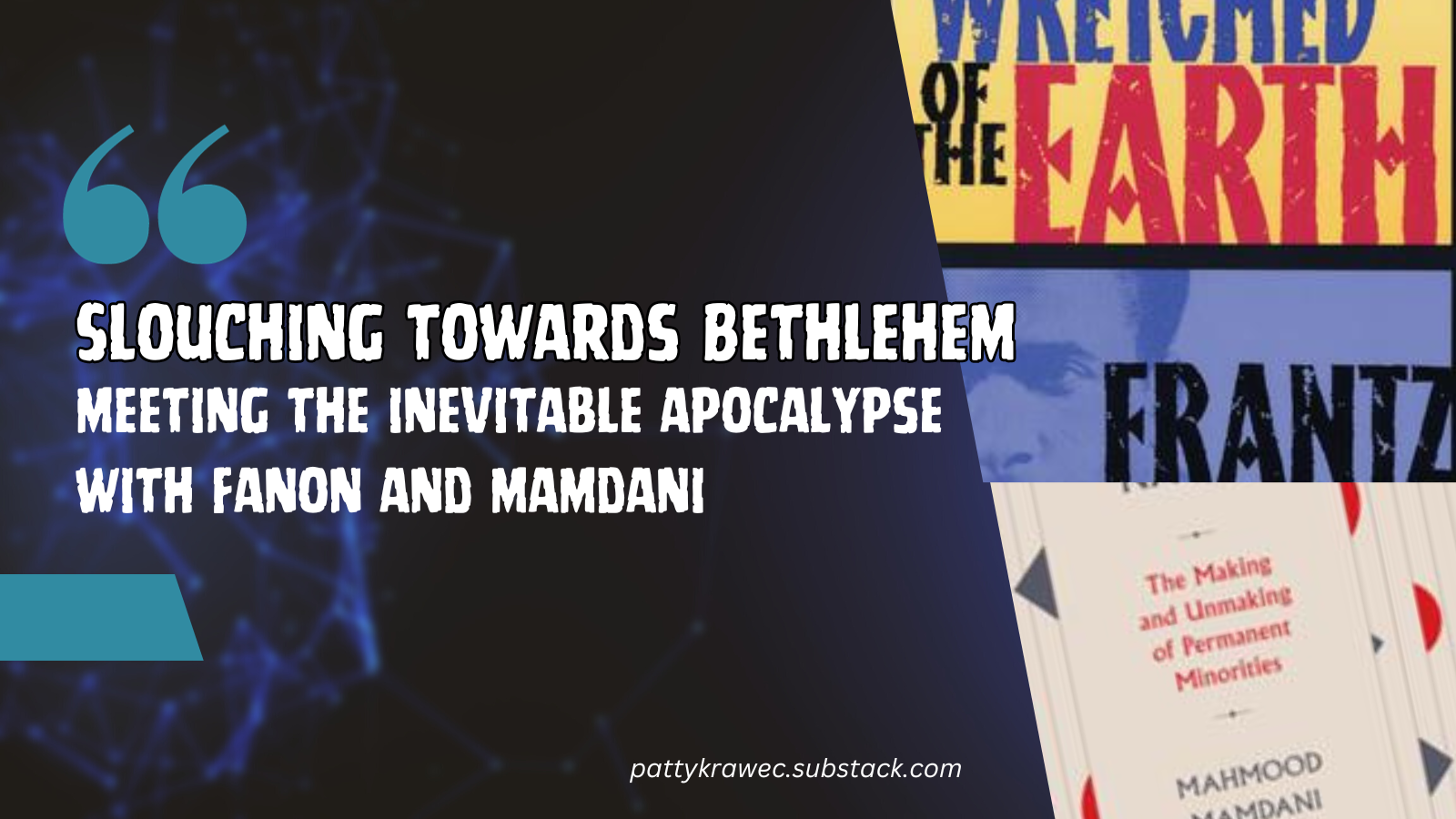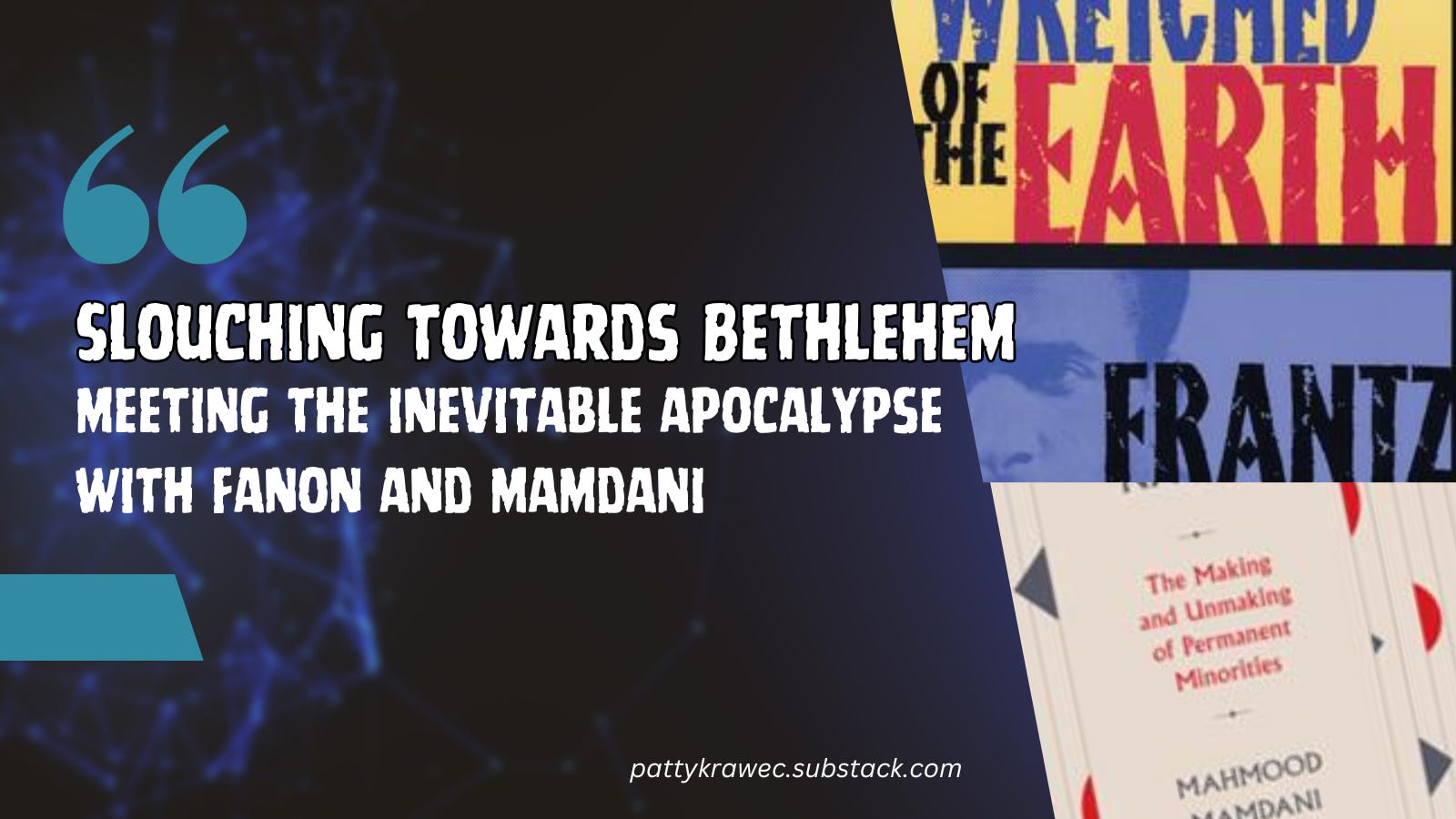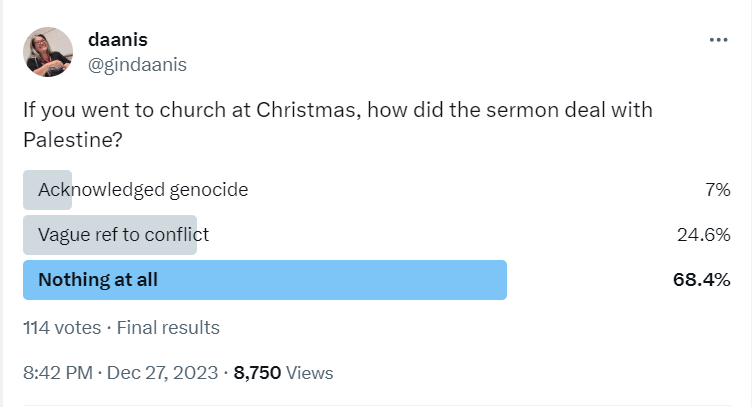Slouching towards Bethlehem
meeting the inevitable apocalypse

Many years ago the pastor of a church I went to invited us to write letters to the church. He was preaching from Revelation and there are a series of letters that Jesus sends to the churches so he invited us to think about what Jesus would write to this church. I didn’t respond, but the letter I immediately thought of was the letter to the church at Laodecia. It is the only one of the letters that doesn’t have anything complementary to say and it includes this banger:
“I know your works. You are neither cold with apathy nor hot with passion. It would be better if you were one or the other, but you are neither. So because you are lukewarm, neither cold nor hot, I will vomit you out of My mouth.
(Rev 3:15,16, The Voice)
People regularly associate Laodecia with the western church but I applied it to this particular church because they just don’t take a stand on anything. Loads of nice people, kind and generous often far beyond what you would assume to be their capacity. But it stops there. It stops with charity and generosity and doesn’t do a blessed thing about the reasons that the need for charity exists.1 Which is not unusual at all, it took me a lot of years and re-orienting my thinking towards a different, liberatory politics. Charity is great, helping and donating if you have the resources but if it ends there then your good works just support empire and every organization does this so you can also lay off criticizing churches2 and think about whatever organization you belong to. I didn’t send the letter, but I did start to think about how I’m part of this problem and got working on ways I could do things differently.

Anyway, the reason that this is in my brain right now is because of Palestine and it being Christmas. Early in the season I challenged churches not to mention Palestine in their Christmas messages (I promise I’m getting to Fanon) and then on the 27th I decided to create a Twitter poll to see how they did and they did not disappoint. Or maybe they did.

“I will vomit you out.”
Literally how I felt about the western church after looking at these poll results, although one could argue that they have clearly chosen a side. One user responded that the church they attended didn’t even mention Bethlehem, which is a level of commitment to erasure that I had not anticipated. Not mentioning Bethlehem AT CHRISTMAS? Then I searched the last six weeks of messages from another church3 to see if there were any mentions of Palestine at all and I found one mention in late November that both sides’d it in an attempt to talk about peace that doesn’t come from violence. 4
Now I’m getting to Fanon because we’re in the final chapter and conclusion of Wretched of the Earth in which he writes about “Colonial War and Mental Disorders” and then ties it all together. Remember that Fanon is a psychiatrist and he spent some time during the Algerian war for Independence treating everyone involved in the conflict. We know that he fought with the Algerians and that he wrote about the violence of colonization, so he isn’t sympathetic to those who enact colonial violence but his decision to include a couple of them them in this chapter of case studies means there is a recognition that they are also experiencing harm. Which brings me back to Mahmood Mamdani and his recognition of the same in his discussions of the Truth and Reconciliation Process, the Nuremburg Trials, and what could have been.
Now, when I say that Fanon recognizes that they also experience harm or that Mamdani has a liberatory vision that frees all of us from the violence of colonialism rather than political theatre that absolves power by holding a few individuals responsible, I am not saying that these things are equal. The harms are real but they are not the same. Ruth Wilson Gilmore’s definition of racism becomes helpful here because we can’t lose sight of who is dying and why. The people who are part of those state sanctioned (the IDF in Gaza) or extralegal processes (West Bank settlers) are not experiencing group differentiated vulnerability to premature death, but it doesn’t mean that they are coming away unscathed5.
“Racism, specifically, is the state-sanctioned or extralegal production and exploitation of group-differentiated vulnerability to premature death.”
―Ruth Wilson Gilmore,Golden Gulag: Prisons, Surplus, Crisis, and Opposition in Globalizing California
In the Ojibwe story of the wendigo it is the perpetrator of violence who is transformed into a monster, his victims are only transformed in his distorted vision. Fanon describes this distorted vision in a police officer who is suffering from depression. During treatment this officer makes the absurd remark that “sometimes you feel like telling them that if they had any consideration for us, they’d cough up and not force us to spend hours squeezing the information out of them word by word.” (p195) A few pages later Fanon notes that another wanted the hospital staff to “help him torture Algerian patriots without having a guilty conscience, without any behavioural problems, and with a total piece of mind.” (p 199). This is where the church comes in, alongside Mamdani’s discussion of the creation of political minorities and majorities by the nation-state.
Religion and politics cooperate to the point that they are co-constitutive and together they provide a framework that justifies all manner of abuse and harm because the subjects are in some way refusing to be converted or civilized. Think about the violence of the Inquisition which came to the Americas along with the colonists and was transformed into centuries of violence against Black and Indigenous people via reservations, residential schools, and policing. Victims of abuse and violence are told they should have just complied, not talked back, their refusal justifying the violence used against them.
The Bible is full of messages that can be used to either push back against this kind of violence or encourage it, which is why I get frustrated whenever somebody says that a particular reading is Biblical. I get that what they mean is that a particular reading lines up with how they understand the Bible but there isn’t one single way to read the text. If you are looking for a way to test your reading, just ask yourself if this reading (sermon, lecture, etc) supports empire or subverts it. If it focuses on the individual or the collective. It isn’t that these readings are more or less correct, it’s just that some readings get us to a more liberatory politics6 and others don’t. You can apply that to whatever your faith or philosophical position is. Chances are there are multiple ways to read whatever your foundational writings are.
One of the interesting things that Mamdani does in Neither Settler Nor Native is look at the ways that the Nuremburg Trials actually failed to denazify Germany. By holding individuals accountable for their excesses rather than the state itself for enabling and legislating those excesses, Mamdani argues that the Nuremberg Trials protected the idea of the ethnostate much like punishing “bad police officers” protects the overall violence of the institution. In fact, he points out that after WW2 we saw an explosion of ethnostates along with the violence needed to maintain them. That’s an endorsement of Hitler, not a repudiation. Ethnic cleansing took place throughout Eastern Europe and the Nazi dream of cleansing Germany of Jews was completed via the creation of Israel as a Jewish homeland.
Our ideas of justice and accountability are so deeply informed by the criminal justice system that we truly cannot imagine any other way to deal with wrongdoing. But look again at RWG’s definition of racism. The violence is state sanctioned which means that the solution to the violence of racism means addressing the state itself. We want to make it about individuals, and tbh there’s some validity in dealing with people who say and do racist things. But like charity, if that’s all you are doing then you are propping up an unjust system. The Nuremburg trials and Truth and Reconciliation Commmissions may hold some individuals accountable, but they provide no mechanism to deal with the harms that those individuals have also experienced nor do they address the cause of that violence.
The problem of Residential Schools (aka Indian Boarding Schools) was not simply the abuses by various nuns, priests, and teachers. It was the belief that native children needed to be removed from their parents and civilized. Taking it one step back, it was the still pervasive belief that western literacy is the only valid form of education and the use of systems of education to create good citizens. The Prussian model of education still informs how we educate our children, residential schools just added a layer of cruelty to it.7 The problem with the Third Reich wasn’t just the violence of the camps8. The violence of the camps was the natural outcome of 2,000 years of anti-Jewish violence in Europe. Who do we put on trial for that?
Mamdani locates the problem in the combination of the nation (a political community united by cultural expression, language, and belief) and the state (a political entity in which membership is decided by legislation) because the nation-state enacts membership legislation that benefits one part of its population (the founding nation) at the expense of the others who become permanent minorities. Minority doesn’t mean that there are fewer of them. It means they have access to fewer, if any, benefits of membership. It means that the state sanctioned or extra legal production of group differentiated vulnerabilities targets them. Sometimes it is obvious (concentration camps, denial of citizenship) and sometimes it is not (funding structures that result in the organized abandonment of certain groups).9 And it doesn’t mean that only permanent minorites are harmed by these policies. As la paperson has pointed out, you don’t have to be Indigenous to be harmed by anti-Indian policies.10
So what does all this have to do with being vomited out while some beast slouches inexorably towards Bethlehem?
The constant denial of man, the avalance of murders … Two centuries ago, a former European colony took it into its head to catch up with Europe. It has been so successful that the US has become a monster where the flaws, sickness, and inhumanity of Europe have reached frightening proportion.” [transformed into a monster and his vision distorted with mental illnesses, the perpetrators that Fanon treated alongside the] “the core of despair crystallized in the body of the colonized.
Fanon, Wretched of the Earth, pp 236-237, 219
If all we do is treat the symptoms and punish individuals for what is basically excessive support for the colonial project, then nothing changes. We aren’t going to Wellness Wednesday and yoga our way out of the harms of colonialism. Similarly, if all we do is donate, however generously, without addressing why that charity is needed, then nothing changes. And if we refuse to talk about the genocide taking place in broad daylight, we truly deserve to be vomited out. Fanon treated all of their illnesses, but he also worked to educate the native Algerian towards a national consciousness, challenging and confronting the lies told by colonial power. And he took up arms when it was necessary to do so. Mamdani sought a liberatory practice that frees all of us from the harms of colonialism while recognizing that those harms are not equal, and recognizing that righting wrongs may be painful for those who have benefited from those harms. If we refuse to hold the state itself accountable for its violence, or worse, if we refuse to admit that the state is even at fault then we perpetuate that violence and we make ourselves and our organizations complicit. As both Fanon and Mamdani point out, even if we are successful in overcoming unjust power, unless we deal with the fundamental beliefs and assumptions of these nation-states we’ll only replicate it in our own ways.
The rough beast of apocalypse is slouching towards us, how we meet that change is up to us.
The Second Coming
Turning and turning in the widening gyre
The falcon cannot hear the falconer;
Things fall apart; the centre cannot hold;
Mere anarchy is loosed upon the world,
The blood-dimmed tide is loosed, and everywhere
The ceremony of innocence is drowned;
The best lack all conviction, while the worst
Are full of passionate intensity.
Surely some revelation is at hand;
Surely the Second Coming is at hand.
The Second Coming! Hardly are those words out
When a vast image out of Spiritus Mundi
Troubles my sight: somewhere in sands of the desert
A shape with lion body and the head of a man,
A gaze blank and pitiless as the sun,
Is moving its slow thighs, while all about it
Reel shadows of the indignant desert birds.
The darkness drops again; but now I know
That twenty centuries of stony sleep
Were vexed to nightmare by a rocking cradle,
And what rough beast, its hour come round at last,
Slouches towards Bethlehem to be born?
Source: The Collected Poems of W. B. Yeats (1989)
“Mutual aid is the radical act of caring for each other while working to change the world.” David Space, inside cover of his book, Mutual Aid. ↩
We can also forget this idea that churches “ought to do better” as if there is some kind of higher ideal that they should be held to. It’s a big book with sometimes contradictory messaging about how we’re supposed to live made worse by it’s alignment with empire, something that arguably started with Paul himself. Which doesn’t mean that they shouldn’t do better. Obviously we should all be doing better. ↩
Only because this church has transcripts that made it easy to search. I have asked people I know who attend other churches. One does not recall any mention of Palestine, another was very disappointed in their church for not saying anything. Very honorable mention to Silver Spire in St. Catharines that has mentioned it, fundraised for it, and makes good space for broad discussions. ↩
This is the part where I admit that on October 8 I spoke at a church and had intended to mention Palestine but after being asked not to say anything about queer people to avoid derailing my central message (apparently I had agreed not to earlier but that doesn’t sound like something I would agree to, so I decided to accept that I said something that could have been construed that way) I decided that Palestine would be similarly unwelcome and settled for pausing after saying “from the rivers to the sea”, which is a line from a song that we concluded with, and then repeating it with another pause. It felt gross and awful and now before accepting speaking engagements I make sure that people know you can’t invite me to talk about decolonization and be surprised that Palestine and queer life will come up. ↩
Has Israel tried not making/allowing them do a genocide? That might help. Remember: state sanctioned (IDF in Gaza) or extra legal production (West Bank settlers) of group differentiated vulnerability to premature death.
Politics! Everybody hates that word. But politics is just the “historic processes that configure membership” in a community. (Mamdani, p 331). When we get upset over drama in a group we belong to or “politics,” what we are upset about are the things that are happening which impacts who belongs and who doesn’t. This is true whether we are talking about nation-states, churches, unions, or social groups and it matters because belonging means having access to certain things. ↩
Must acknowledge Tyson Yunkaporta’s book Sand Talk where I first read about this. It horrifying, but it’s not even controversial, I just hadn’t heard of it. ↩
And can we please stop seeing the concentration camps as some kind of global abberation that only existed in Germany for a handful of years? Reservations, Plantations, Boarding Schools, Internment Camps, Prison work camps, migrant detention facilities, kids in mfing cages, just off the top of my head. This is a fundamental strategy of colonial powers wanting to rid themselves of people who aren’t part of their body politic. Hitler took them to really ugly places, but he didn’t invent them and countries all over the world still use them, still starve people in them, still refuse to provide medical care and basic necessities. ↩
Organized abandonment is a phrase I encountered through the writings of Ruth Wilson Gilmore and others, but it’s actually a business term that describes the process of freeing up resources by deliberately underfunding certain projects your business has committed to so that they fade away. ↩
cited by Max Liboiron in Pollution is Colonialism. p 40 ↩
